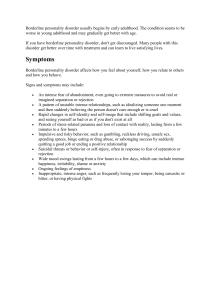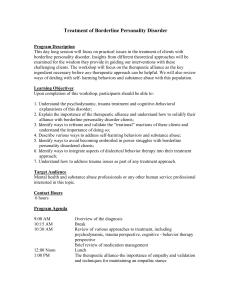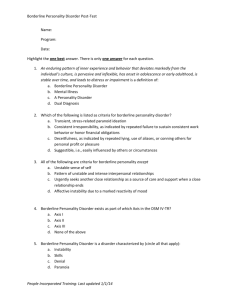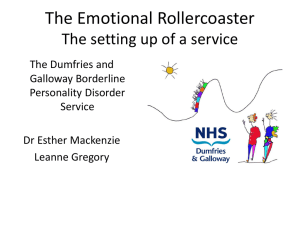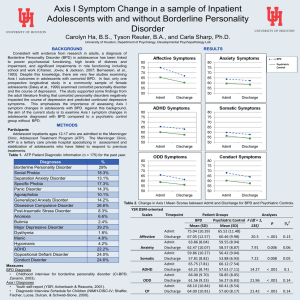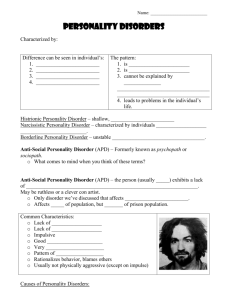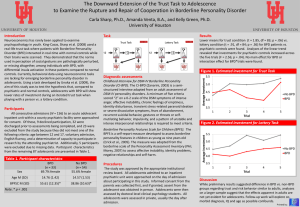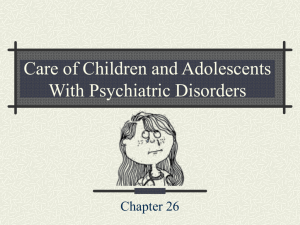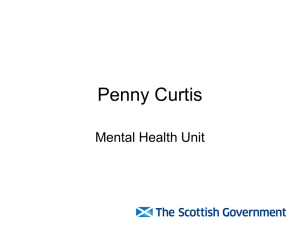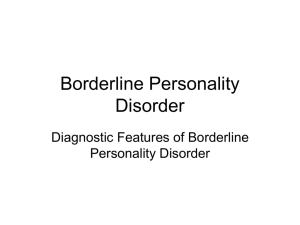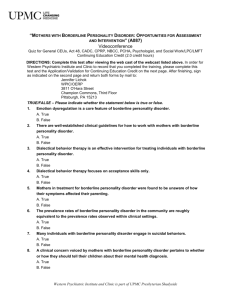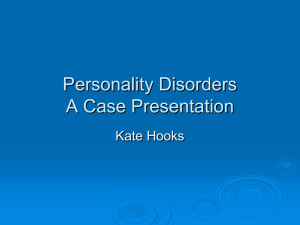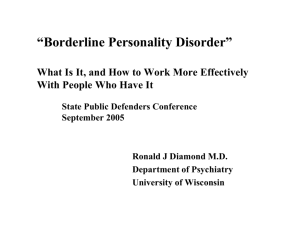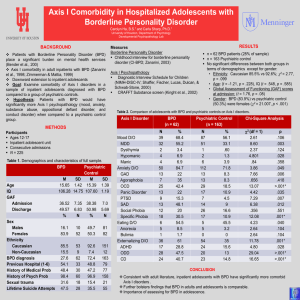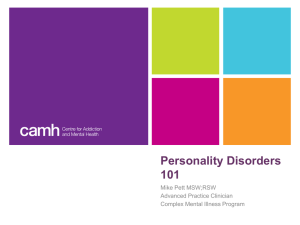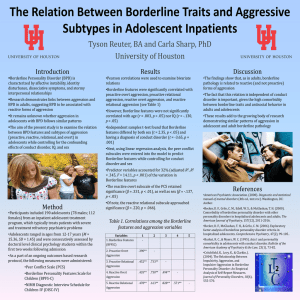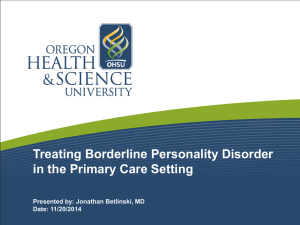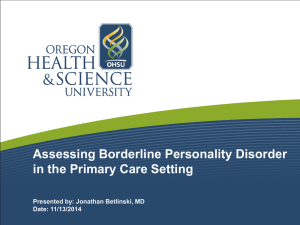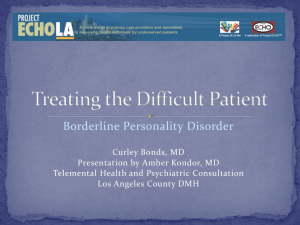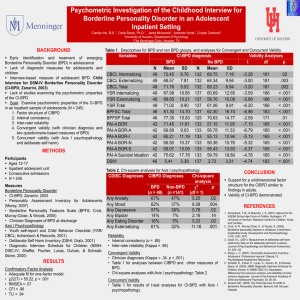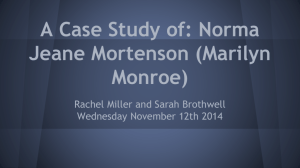What's in a name.........emotional instablility in Adolescence
advertisement
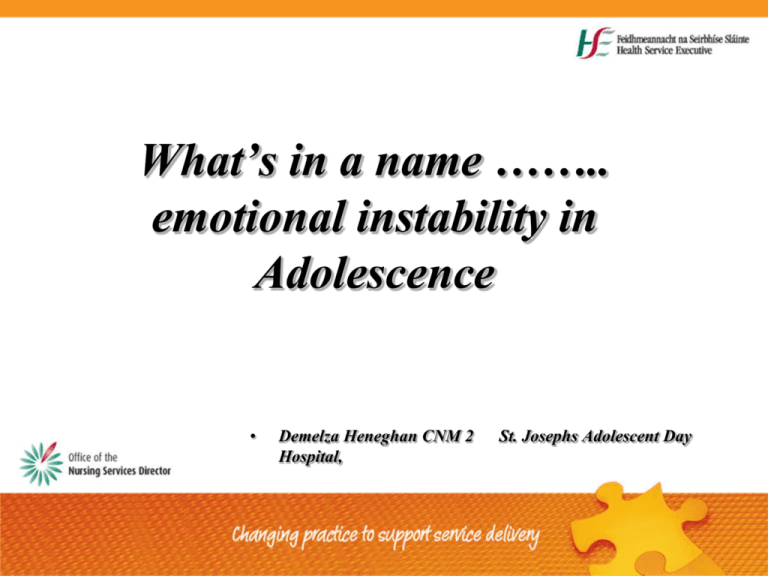
What’s in a name …….. emotional instability in Adolescence • Demelza Heneghan CNM 2 Hospital, St. Josephs Adolescent Day Emotionally Unstable [Borderline] Personality Disorder F60.3 - ICD10 Description, World Health Organization Emotionally unstable [borderline] personality disorder is characterized by a definite tendency to act impulsively and without consideration of the consequences; the mood is unpredictable and capricious. There is a liability to outbursts of emotion and an incapacity to control the behavioural explosions. There is a tendency to quarrelsome behaviour and to conflicts with others, especially when impulsive acts are thwarted or censored. Two types may be distinguished: Impulsive Type Borderline Type •Emotional instability •lack of impulse control ( In addition) by disturbances in •self-image, aims, and internal preferences, by chronic feelings of emptiness, by intense and unstable interpersonal relationships, and by a tendency to self-destructive behaviour, including suicide gestures and attempts. Borderline Personality Disorder - Diagnostic Criteria, American Psychiatric Association DSM An individual diagnosed with borderline personality disorder needs to show at least 5 of the following criteria •Frantic efforts to avoid real or imagined abandonment. •A pattern of unstable and intense interpersonal relationships characterized by alternating between extremes of idealization and devaluation. •Identity disturbance: markedly and persistently unstable self-image or sense of self. •Impulsivity in at least two areas that are potentially self-damaging (e.g., spending, sex, Substance Abuse, reckless driving, binge eating). •Recurrent suicidal behaviour, gestures, or threats, or self-mutilating behavior. •Affective instability due to a marked reactivity of mood (e.g., intense episodic dysphoria, irritability, or anxiety usually lasting a few hours and only rarely more than a few days). •Chronic feelings of emptiness. •Inappropriate, intense anger or difficulty controlling anger (e.g., frequent displays of temper, constant anger, recurrent physical fights). •transient, stress-related paranoid ideation or severe dissociative symptoms. • This enduring pattern of inner experience and behavior must deviate markedly from the expectations of the individual's culture. • This enduring pattern is inflexible and pervasive across a broad range of personal and social situations. • This enduring pattern leads to clinically significant distress or impairment in social, occupational, or other important areas of functioning. DSM – IV states , ‘personality disorder categories may be applied to children or adolescents in those relatively unusual instances in which the individual's particular maladaptive personality traits appear to be pervasive , persistent and unlikely to be limited to a particular developmental; stage or an episode of and Axis 1 disorder……………..severe enough that behavioural manifestations persistently interfere with the an adolescents daily functioning over the course of 1 year or longer. Fact or fiction: Diagnosing borderline personality disorder in adolescents Alec L. Miller, Jennifer J. Muehlenkamp , Colleen M. Jacobson Received 15 March 2007; received in revised form 7 February 2008; accepted 13 February To name or not to name…….. One example…….. CAMHS Paediatric inpatient assessment Day Hospital Adolescent Inpatient Unit Inpatient admission Overlap x4 weeks with the day hospital Day Hospital admission X 2 weeks Ind. / parent Discharge overlap with CAMHS x 2 weeks Integrated Care Plan Nursing Care Plan 1. Psychoeducation using a DBT Framework – Interpersonal effectiveness – Distress tolerance – Emotional regulation – Mindfulness Both with young person & parent/carer 2. Skills training • Utilising the DECIDER Programme on an individual basis As a service …. • Individualised care plan • Intensive psychoeducation • Careful consideration of multiple service involvement and the yp moving through this Randi Kreger and Paul T. Mason explain in their book “Stop Walking on Eggshells,” you may inadvertently trigger a BPD emotional outburst but your behavior didn’t cause it. Thank you !! Fortunately, the critical importance of prevention, early identification, and early intervention has gained traction for all forms of illness, and mental disorders in particular have been referred to as the chronic diseases of the young. Brain development during childhood and adolescence is complex As adolescents are expected to engage in more independent emotion regulation and self-control strategies, deficits in self-regulatory skills become more apparent during this developmental period. Can one accurately assess and identify BPD in children and adolescents? How does one understand the development or early precursors of BPD in Children and adolescents.
